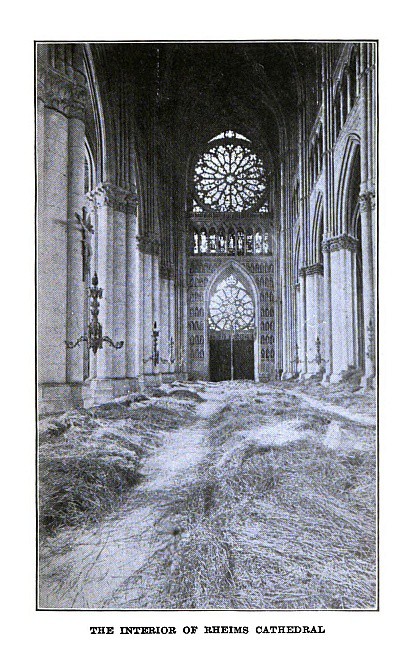Henry Russell Wakefield - A Fortnight at the Front
Here you can read online Henry Russell Wakefield - A Fortnight at the Front full text of the book (entire story) in english for free. Download pdf and epub, get meaning, cover and reviews about this ebook. publisher: Start Publishing LLC, genre: Art. Description of the work, (preface) as well as reviews are available. Best literature library LitArk.com created for fans of good reading and offers a wide selection of genres:
Romance novel
Science fiction
Adventure
Detective
Science
History
Home and family
Prose
Art
Politics
Computer
Non-fiction
Religion
Business
Children
Humor
Choose a favorite category and find really read worthwhile books. Enjoy immersion in the world of imagination, feel the emotions of the characters or learn something new for yourself, make an fascinating discovery.
- Book:A Fortnight at the Front
- Author:
- Publisher:Start Publishing LLC
- Genre:
- Rating:5 / 5
- Favourites:Add to favourites
- Your mark:
- 100
- 1
- 2
- 3
- 4
- 5
A Fortnight at the Front: summary, description and annotation
We offer to read an annotation, description, summary or preface (depends on what the author of the book "A Fortnight at the Front" wrote himself). If you haven't found the necessary information about the book — write in the comments, we will try to find it.
A Fortnight at the Front — read online for free the complete book (whole text) full work
Below is the text of the book, divided by pages. System saving the place of the last page read, allows you to conveniently read the book "A Fortnight at the Front" online for free, without having to search again every time where you left off. Put a bookmark, and you can go to the page where you finished reading at any time.
Font size:
Interval:
Bookmark:

Perhaps it would be of interest to give a little account, without, of course, mentioning names, of the events of one or two days when a visit was paid to the trenches. On one occasion after motoring through towns that are a household word, both at home and with our Allies, towns which have seen the Germans in them and then driven out of them, places where the buildings are practically level with the ground, the limit for vehicular traffic is reached and one goes forward on foot. Soon you reach a cutting in the ground and you begin to walk along a trench. You turn now and again either to right or left, seeing sign-posts telling sometimes in comic language and sometimes only by number the name, as it were, of the underground street; you then rise a little and find yourself walking in the inside of houses so shattered that you cannot tell much about what they originally were until you are told that they formed a street in a little overgrown village of which nothing is left, and the last inhabitant of which was the station-master, who refused to leave though there was neither train, station nor house for himself left, because so long as he remained on the spot he could claim his pay. Forcible measures had at last to be used to secure his departure. Where you are walking you are yourself hidden from the enemy, but are within the range of their fire. You are taken up to an observation post, where one of your companions incautiously takes out a white pocket-handkerchief and is hurriedly told to put it back in his pocket. You come down again and you proceed cautiously along trenches. Now and again shells pass over, and your careful guide looks to see in what direction they are falling, as, though he is quite unconcerned for himself, he knows that he is responsible for the safety of the troublesome visitor. You are told to keep your head down and not to show, for the moment at any rate, any desire to view the landscape. Soldiers are dotted about here and there, all of them ready to give a kindly greeting, and then at last you reach a point where you are told not to speak loudly because practically only a few yards away is the enemy, who, were he to hear conversation, might think it worth while to throw over a hand grenade. What looks like a tiny bit of glass at the end of a short stick is there before you, and you are asked to look into it; when you do the enemies' trenches are visible to you. Beyond an occasional ping against a sandbag, you have heard nothing to note the existence of rifle fire, except that the men you have passed have got these weapons to hand. You tell the men at the advanced posts how proud their country is of them, how thankful you are to have seen them, how you pray that God may bring them back safe to their homes; you get rid of all cigars or cigarettes you may have upon you, wishing that you had thousands more, and then you return home, varying perhaps the route through the communication trenches.
On another occasion our way took us through a town which is absolutely razed to the ground and is still under shell fire. There I saw two soldiers busy with spades, and I asked what kind of fortification they were putting up, to which, with a broad grin, one replied that they were looking for souvenirs. He was kind enough to give me a complete German cartridge case, for which he refused to take any remuneration. Going on a little farther in this town, we went down some steps and found ourselves in an underground club full of soldiers, who were having a hot meal, were reading papers and playing games, everything being presided over by perhaps the most magnetic person I met on my travels, a young Chaplain to the Forces, who would not wish his name to be mentioned, though there is probably no one out at the Front who will not know to whom I refer. When we went from this place towards the more advanced trenches, I was taken along a road which looked perfectly harmless, when suddenly a stalwart Scotchman told my companion and myself that we must get off it at once as it was a favourite target for German Maxims. Never was General more obediently submitted to than was this, I believe, private soldier. It was on this occasion that we had tea in the dug-out of the Colonel, who bears a name distinguished in English naval, military and sporting life. A characteristic of the German trenches which I noticed on this and other occasions, was that their sandbags seemed to be generally white in colour, at any rate in those of the first line. Leaving the trench on this particular day, we had to go through an almost alarming thunderstorm, which in the course of half an hour made a sea of mud of the place which had been quite dry before. It was curious to notice how petty the sound of the guns appeared as compared with the artillery of heaven.

THE INTERIOR OF RHEIMS CATHEDRAL
Pathetic incidents occur and touching scenes are visible on these journeys to the Front. One looked in the trenches upon little mounds and crosses, marking the resting-places of men who had been hurriedly, but reverently, buried. There they are side by side with their living comrades, who are doing their work whilst their brothers sleep. Dotted all about the country are little cemeteries, which tell of devotion unto death, and which remind one of all the sorrow this war has caused. It is strange to see how religious emblems appear to have been strong against shell. Constantly you would see a church almost totally destroyed and yet the crucifix untouched, and who will ever forget that sight which can be seen for miles around, of the tower which has been almost shattered to pieces and yet the statue of the Virgin and Child, which was near the top of it, though bent over completely at right angles, still remains, as it were blessing and protecting the whole neighbourhood.
This leads to the consideration of the religious condition of our troops as affected, first, by the churches and worshippers of France, and, secondly, by their own experience in this war. More than one mentioned the pleasure felt at the sight of the little wayside shrines which they passed on their march. Others commented upon the large numbers of people they saw flocking to their early communion, and many expressed a hope that permission might be secured for parade services to be held in the naves of the various parish churches during the winter time, when the cold is great and when it is almost impossible to secure any suitable building other than the churches for worship. Negotiations have been going on upon this matter, and some of the French ecclesiastics are not unfavourable, but a difficulty which is prominent to the minds of some of the French Bishops arises out of the recent separation of Church and State. There is a considerable party in France anxious to secure the ecclesiastical buildings for different sects, and even in some cases for secular purposes. It is felt, therefore, that a precedent might be made of a dangerous character were permission to be given to our troops to have services in these sacred buildings. We may, however, be quite confident that those responsible for the spiritual care of our soldiers in France will deal with this whole question wisely and tactfully. It does seem strange that men who are fighting for the liberties and rights of France, and whose religion is, after all, not antagonistic to the faith of the people of that country, may not have the shelter of the less sacred part of a parish church in order to offer up their prayers to Almighty God. It is when one gets face to face with such circumstances as these that the pettiness of religious strife strikes one with force. Is it just possible that out of this great conflict there may arise a stronger desire for religious unity than the world has ever yet known?
Font size:
Interval:
Bookmark:
Similar books «A Fortnight at the Front»
Look at similar books to A Fortnight at the Front. We have selected literature similar in name and meaning in the hope of providing readers with more options to find new, interesting, not yet read works.
Discussion, reviews of the book A Fortnight at the Front and just readers' own opinions. Leave your comments, write what you think about the work, its meaning or the main characters. Specify what exactly you liked and what you didn't like, and why you think so.











